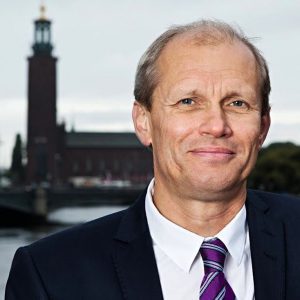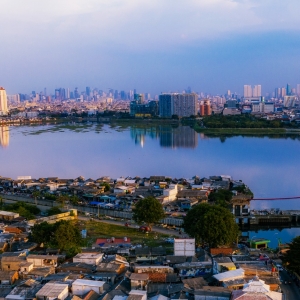Speakers

Torgny Holmgren
Torgny Holmgren is the Executive Director of the Stockholm International Water Institute.

J. Carl Ganter
J. Carl Ganter is co-founder and director of Circle of Blue, the center for frontline reporting, research, and analysis on water resource issues and their relationship to food and energy in a changing climate.
SIWI’s Executive Director Torgny Holmgren discusses the new layer of urgency in the water sector, World Water Week 2019’s theme, and much more.
Transcript
J. Carl Ganter: I’m here with Torgny Holmgren, executive director of the Stockholm International Water Institute, and we’re on the floor of World Water Week. Torgny, it’s a really different year for World Water Week in both not only venue but also the state of the world. Maybe you can frame that a little bit for me.
Torgny Holmgren: Thanks. And thanks for having me. Yes, that’s true. World Water Week has now moved into a new arena, new stadium, kind of a multi purpose arena. It’s due for us, but we think it gives a flexibility and also to adapt to current circumstances where people would like to interact more than listening to speeches and lectures, et cetera. That is part of it, but it’s not on the World Water Week, that [inaudible 00:00:45] we realized where we are in the world today as the climate crisis, not only looming, escalating. And we knew that we have extinction of species that we learned from different reports recently. So that gives us a concern for the future where are we heading?
J. Carl Ganter: A new layer, not that we didn’t have urgency before on the water sector, but a new layer of urgency, and maybe you can tell me a little bit about the theme this year; water for society and for all.
Torgny Holmgren: The water for society, including all theme of this World Water Week. What we said first, I think we are impacted on a daily basis of thousands if not millions of decisions taken on use and allocation of water. It impacts all of us, but not all of us are a part of that decision making. So that is one part of it. We should include all in decision making because we all rely on water, whether it’s in households or we are in manufacturing industry or we are farmers or we are doing some energy production. That is one part. Second part, we know that the most vulnerable groups in our societies, they are left out. We need to get them on board because if there’s anyone paying the price for climate change crisis, et cetera, or they’re vulnerable, and if they don’t have access to clean water, which still is the major one. Number one major problem around the world is the access to clean water.
Then they lose out some 1 billion people, 800 at least, that are not part of the decision making status. We should include a law in the way forward to have a fair allocation that you will support in the future.
J. Carl Ganter: Wow. We’re talking about almost 1 billion people that aren’t part of the decision making. We talked a little bit about that, but how do we bring them into this decision making in a way that brings transparency and accountability in an era, like you said, of urgency, climate change, and all these other stressors?
Torgny Holmgren: Water has one key advantage or at least a number of advantages. It connects us. It’s a connector I claim often between actors and counters, et cetera. But also water is a local resource, which means starting from the local level, you should include the people in the local level. I think that is a key advantage with water that we all rely and depend on water. That is also good that they bring in those who are dependent in the local circumstances of water. Maybe easier said than done, but I think we have examples of that also, for instance, our stock on water price lowered this year, Dr. Jackie King from South Africa who have researched and also experience and develop tools, how to include local population, river system management. I think she gave us some examples this morning about how to involve people who are dependent or live on the rink of rivers, but those in the decision making.
J. Carl Ganter: We heard from her this morning. My big question I guess is maybe the obvious one is that how do we get to scale and it’s to speed in the decision making, the moderation, the mediation, all of the things that really need to happen, at pace.
Torgny Holmgren: That’s true and I claim and we claim in our Institute that key for water is governors management of water. We realize and we experienced and we discussed with leaders from different countries, irrespective plenty water, littler water, it how’s your manage, how you govern it. That is most important to have a true governance system you need to enable, you should include you to paint it more optimistic by including all, then you’ll have better governance system and the management system and your can be quite assured to show that you have improved your possibilities to have all access to clean water.
J. Carl Ganter: That’s one thing that Dr. King talked about this morning was the fact that water is actually written into the constitution in South Africa. Are there other examples where that is happening at the high level governance?
Torgny Holmgren: It’s quite interesting and Dr. King told us this morning also early on, sometimes the crisis trigger reforms, but do we need a crisis to reform in South Africa? Of course after apartheid there was a possibility of very new opportunity to have a new constitution, but they have this included in the constitution. But in all societies as our own, we take some more time from the European union context as such. I think to some extent it’s was what could we learn from other countries and what another advantage I see with water, it’s a truly global issue. If I look at the SDGs, the 17 still, many of them are, how can the Global South develop learning from the Global North but in water it’s a total global issue of what can we learn from the South Africa constitution from other countries. So that is one example. There are the examples also in Chile, Australia, et cetera, where they have made reforms mainly due to there are crisis situation that have erupted.
J. Carl Ganter: I was just going to say, so crisis situations, so we have more on the horizon. Of course we heard Chennai, Cape town, some dozen or more than a dozen cities depending on where the metrics of so called day zero cities. You know casting forward for us. Are we prepared for these crises and are we prepared to leverage, should we say the learning points?
Torgny Holmgren: If we’re ready or not, I’m not quite sure. But when the crisis occur, take Sandy, New York, or Katarina in New Orleans, Louisiana. We have Chennai as you mentioned Cape and also Paula. Those cities in those areas have really learned the hard lesson, what it means to not be prepared for what could come. So I there are a number of examples around the world now in big city areas and we know that there are number of mega cities on the brink to get into the same situation as Chennai. So I think why don’t we gather as we do often, city mayors or learn from the experience that they have in those five cites, already now and other regions that have faced water shortage.
J. Carl Ganter: Are those cities mayors stepping up, are they curious? Are they interested?
Torgny Holmgren: I think so. A few years ago at this World Water Week, we also voted that at the [inaudible 00:07:00] which is a Durban area of water. How they have handled their water situation. It was not a crisis situation, but I think thanks to their forward looking management and governance is that they have not come into crisis. And I think what could we learn from Durban for instance, how to handle the situation where you can run into a water shortage. I think there are possibilities. There are good examples of areas, Murray-Darling in Australia for instance, that are, that we should learn from. And I think why don’t use conferences like this to learn more from other areas of the world.
How we can develop and how we can also improve the way that we prepare ourselves for a crisis that we would not like to come.
J. Carl Ganter: One last question on climate change. The climate issue is forefront on the news and forefront in a lot of minds. Yet, water still seems to take a back seat. Where is water in the climate conversation or where should it be?
Torgny Holmgren: Growing I would say, in awareness, but it’s still some ways to go, it took us some 10 years to get the water on the agenda of the climate change negotiations table. It’s there now, but still I think really dealing with water on daily basis can even do more to make that change in that perception of the critical part that water plays in solving the climate crisis. We know that climate change is manifested mainly through too little or too much water.
If I speak to the mayor of New York, he or she knows it, the person, or New Orleans, or in Louisiana. But I think on the overall, I think still climate is mainly of course about the; not reached the two degrees of centigrade growth in temperature, but water is, I think not only the effects of climate, because it could also solve the climate crisis. So I think still some months ago I learned more from the climate negotiators and climate leaders that waters is come to agenda, but I think we can do more to make that happen.
J. Carl Ganter: Great, and next year, what do you think will be the big topics we’re talking about here on the floor at World Water Week?
Torgny Holmgren: You mentioned it, climate, it’s climate. Yes, it’s climate. We have another 12 months ahead of us now with the UN Climate Summit 23rd of December the COP in Chile and we will focused on the water and climate addition next year to help raise the issue of water in the climate context.
J. Carl Ganter: Great. Well, I’m sure we’ll be back here again and from the busy floor here at Stockholm World Water Week. I’m J. Carl Ganter for Circle of Blue. Thanks for joining us.
Torgny Holmgren: Thank you.
Related
© 2025 Circle of Blue – all rights reserved
Terms of Service | Privacy Policy



